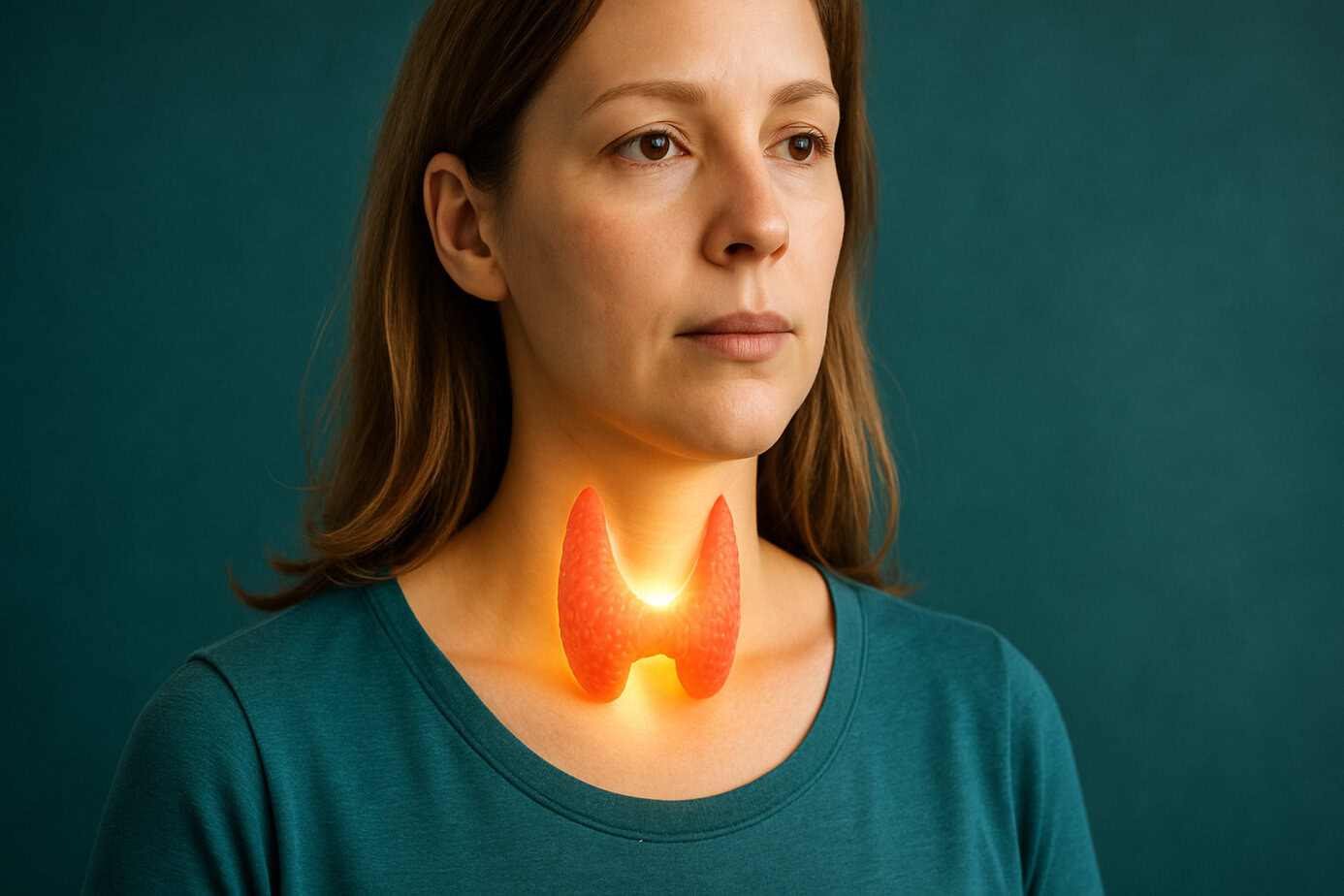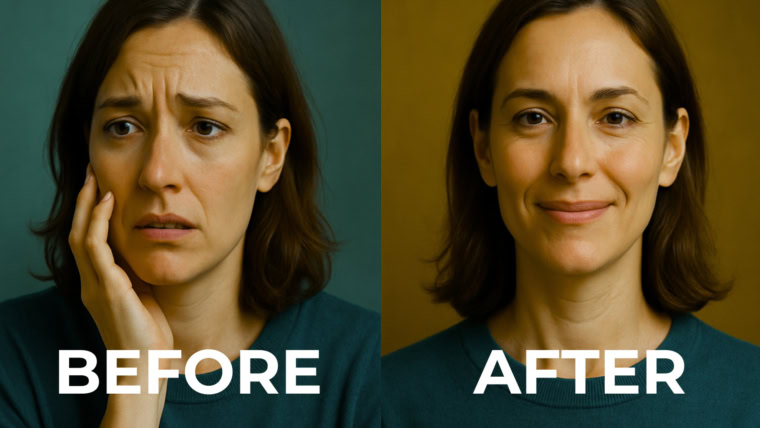For years, Mia blamed herself for being tired.
She went to bed early, drank green smoothies, and tried harder. Still, she struggled to get up in the morning. Her skin was dry, her hair was thinning, and her periods were becoming irregular.
Blood tests showed slightly elevated TSH. Her doctor called it “borderline.” She was told to monitor it, maybe consider medication later.
But Mia didn’t feel borderline, she felt like she was fading.
This is the quiet, persistent experience many people with hypothyroidism go through.
Let’s talk about why, and what homeopathy has to offer.
What Is Hypothyroidism?
Hypothyroidism means the thyroid gland isn’t producing enough hormones to meet the body’s needs.
Thyroid hormones regulate:
- Metabolism
- Energy production
- Temperature regulation
- Mood and mental clarity
- Skin, hair, and menstrual cycles
When levels are low, everything slows down, sometimes subtly, sometimes dramatically.
Symptoms Aren’t Always Obvious
Hypothyroidism doesn’t always announce itself clearly. It can be misread as depression, burnout, or just “getting older.”
Common symptoms include:
- Fatigue, sluggishness, or brain fog
- Cold intolerance, dry skin, constipation
- Thinning hair or brittle nails
- Menstrual irregularities or fertility issues
- Low libido
- Weight gain despite no dietary changes
- Puffy face or eyelids, especially in the morning
- Depression, apathy, or emotional flatness
- Hoarseness or slowed speech
Many of these signs build slowly, and are easy to overlook until they become entrenched.
Types of Hypothyroidism
Not all cases are the same. Understanding the root is key:
- Primary Hypothyroidism: the thyroid itself is underactive (often due to autoimmunity)
- Hashimoto’s Thyroiditis: an autoimmune condition where the body attacks its own thyroid
- Secondary Hypothyroidism: due to dysfunction in the pituitary or hypothalamus
- Postpartum Thyroiditis: inflammation following pregnancy
- Subclinical Hypothyroidism: mildly elevated TSH with normal T3/T4, symptoms may still be present
Conventional treatment typically involves synthetic hormone replacement (like levothyroxine). This can help balance labs, but many patients report persistent symptoms.
Why? Because medication corrects the numbers, but not always the underlying imbalance.
A Broader Question: Why Did This Happen?
Homeopathy doesn’t stop at “what”, it asks why?
What made the thyroid slow down in your case?
- Was there chronic stress that overburdened your adrenal-thyroid axis?
- Have you lived through grief or heartbreak that never fully resolved?
- Is there a pattern of emotional suppression or self-sacrifice?
- Did things shift after pregnancy, surgery, or trauma?
- Are there inherited tendencies, an autoimmune pattern in your family?
In Classical Homeopathy, we work with the full picture, not just lab values, but the human story behind them.
The Homeopathic Approach
Rather than targeting the thyroid alone, homeopathy seeks to rebalance the entire system emotional, hormonal, metabolic, and energetic.
It looks at:
- Your unique symptom expression (physical and emotional)
- The timing and trigger of your condition
- Mental-emotional patterns, such as grief, guilt, self-silencing, or burnout
- Modalities, what makes you feel better or worse
- Constitutional traits, the underlying tendencies you carry
In this model, the thyroid isn’t the problem, it’s the messenger.
Common Remedies for Hypothyroidism
There’s no single remedy for hypothyroidism. It always depends on the individual’s expression.
But here are some often-indicated types:
| Remedy | Profile |
|---|---|
| Calcarea Carbonica | Fatigue, slowness, coldness. Mental: Anxious about health, overwhelmed easily, fears losing control Physical: Cold hands and feet, sweats on the head (especially during sleep), gains weight easily, sluggish metabolism, puffiness. Etiology: Chronic stress, genetic predisposition, slow recovery after illness. |
| Sepia | Hormonal fatigue, indifference, heaviness in lower body. Mental: Irritability, apathy, emotional disconnect from loved ones, feels burdened but numb. Physical: Dry skin, constipation, hair loss, hormonal imbalances (PMS, menopause), pelvic heaviness. Etiology: Hormonal changes (postpartum, menopause), emotional burnout, suppressed emotions. |
| Silicea | Deep fatigue, chilliness, poor assimilation, and lack of stamina. Mental: Timid, easily discouraged, lacks confidence despite intelligence. Overwhelmed by responsibility, fears failure, avoids confrontation. Physical: Cold hands and feet, excessive sweating (especially feet), brittle nails, hair loss, constipation with no urge. Sluggish healing and weak immunity. Etiology: Poor nutrient absorption, vaccination effects, chronic illness, inherited weakness or glandular dysfunction. |
| Lycopodium | Bloating, afternoon fatigue, mood swings. Mental: Low self-esteem but ambitious, performance anxiety, irritable with close ones. Physical: Gassy after eating, dry skin, hair thinning, energy drops between 4–8 p.m. Etiology: Emotional suppression, liver sluggishness, digestive weakness, inherited tendencies. |
| Graphites | Slow metabolism, obesity, dry cracking skin. Mental: Sensitive, slow thinking, indecisive, morning anxiety. Physical: Constipation without urge, thickened or cracked skin (behind ears, fingers), cold sensation, tendency to gain weight. Etiology: Long-standing skin disorders, endocrine imbalance, family history of sluggish thyroid. |
Each of these remedies paints a pattern, not just of symptoms, but of who the person is in their imbalance.
Curious how remedies are chosen? You can learn more here.
Can homeopathy Replace Thyroid Medication?
Not always, and not immediately.
In some cases, especially autoimmune or long-standing hypothyroidism, medication may be necessary, at least initially. But homeopathy can often:
- Support better energy, mood, and digestion
- Reduce inflammation and autoimmune reactivity
- Address the root emotional contributors
- Gradually rebalance the endocrine system
Some people eventually reduce or discontinue medication under supervision, but this depends on your case, not a one-size-fits-all rule.
Homeopathy doesn’t compete with conventional care, it adds depth where standard protocols stop.
What Does Healing Look Like?
It often begins subtly.
- Sleep improves.
- You feel more alive inside.
- That fog lifts. Your digestion becomes more regular.
- You wake with a sense of purpose instead of dread.
- You stop having to push through everything.
But more importantly, you start recognizing yourself again.
Hypothyroidism isn’t just about hormone levels, it’s often a message that something deeper needs support.
If you’ve been trying to fix this with willpower, supplements, or synthetic hormones alone, but still feel off, homeopathy may offer the missing piece.
It doesn’t just address symptoms. It transforms you.
And that makes all the difference.



